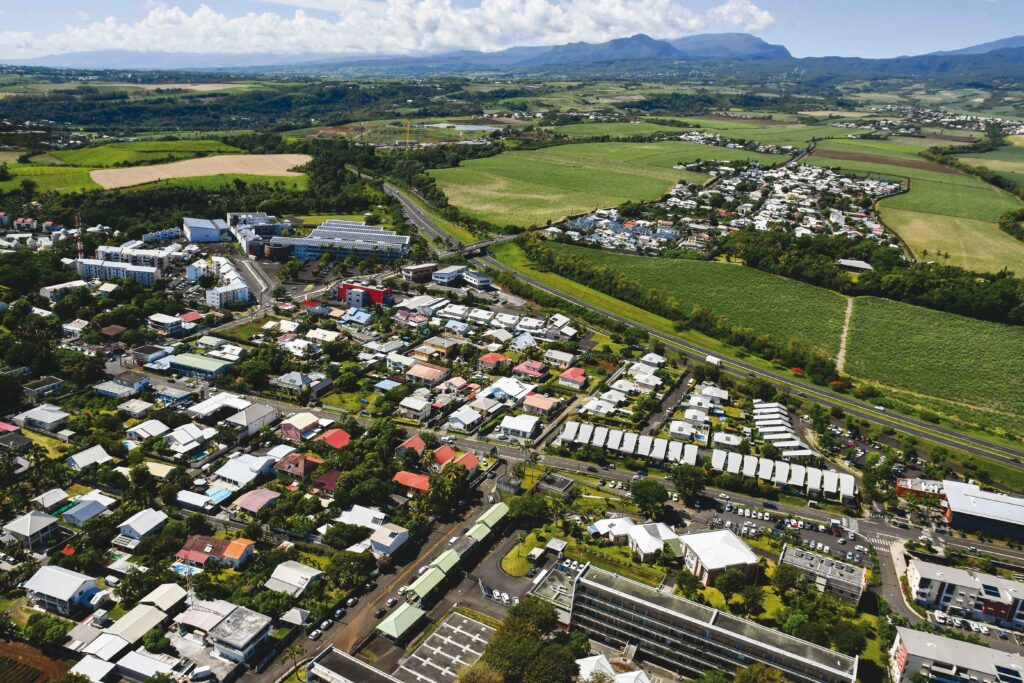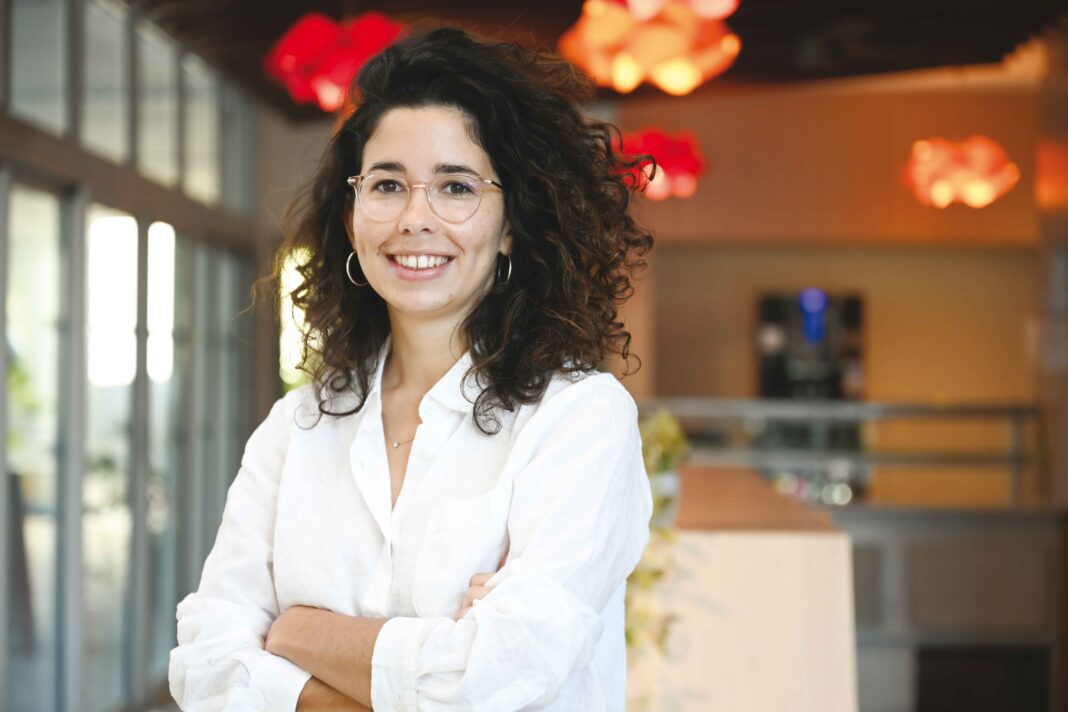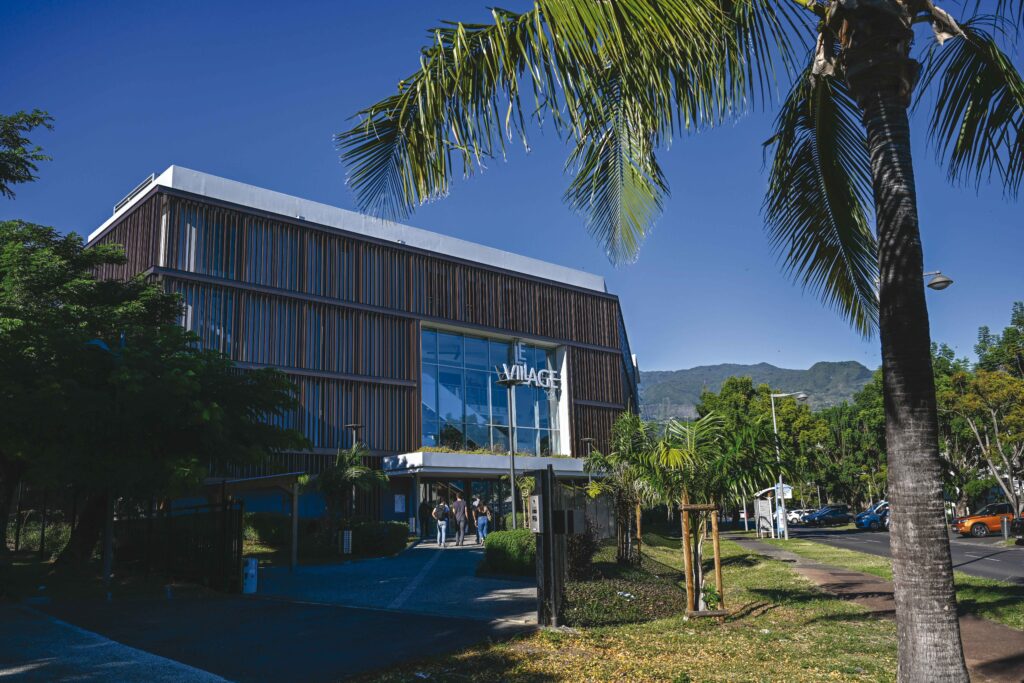The best view of the panorama of the new local economy in the making, it’s the Village by CA in Reunion, “complete ecosystem dedicated to the creation of business and innovation for young entrepreneurs” offering “a cutting-edge environment”. Opened four years ago on the initiative of the regional bank of Crédit Agricole, Since its beginnings, the Village by CA in Reunion has incubated and accelerated the development of around thirty start-ups which are all facets of this new economy exploring the possibilities of collaborative exchange while taking a fresh look at the needs of the territory.. Sophie Dubernet, startup manager, in charge of supporting businesses hosted at the Village by CA, demonstrates the challenges of the new economy for Reunion, the diversity of projects and their local roots.
What is the role of the startup manager ?
The startup manager intervenes at two levels. Upstream, he participates in the prospecting and selection of projects and entrepreneurs who can be supported. in endorsement, he is in charge of this support, he ensures the smooth running of their acceleration programs. I joined the Village team, two and a half years ago. I am the preferred contact for startups, as well as mentors and experts who interact with them. I mobilize all the resources that startups need to succeed in their development over time.. It is individualized support, custom made, which is based on a diagnosis taking into account all dimensions of the company, but also the profile of the manager. Mentors and experts are called upon based on the issues detected by the diagnosis or during support. I'm like a coach, someone who challenges startups, which sets the pace for the progression and acceleration of their projects.
You help already created or emerging businesses ?
Au Village by CA Réunion, we are interested in young startups who already have a first project, a first product and first customers. The startups we support, are between 0 and 5 years old, they are starting their marketing or wish to accelerate their growth and receive support for this. In the meeting, the issue is twofold : ensure that the multiple projects of innovative companies pass the threshold of economic sustainability once their vision is consolidated and their economic model proven, help them to structure themselves. For that, we help them test and define their value proposition and their business model while consolidating the fundamentals of their business. Our objective is to promote business acceleration and more precisely their transition to the scale of the industrialization of their economic model., that’s the whole point of scalable models.
How many startups have been welcomed by the Village by CA in Reunion since its opening in March 2017? ?
The Village by CA welcomed and supported 37 startups. There are currently 23 of them. The Village also welcomes in residence, more mature innovative companies that have successfully developed, such as Orika or Datarocks, des experts, financing players who form a pool of skills and mentors.
Once their expertise has been tested and in return for being able to establish themselves, they provide our startups with their knowledge and experience. In total, there are therefore 45 structures which work daily in the Village, i.e. 157 people.
What are the fields of activity represented ? Do they follow well-defined sectors or do startups innovate through a less compartmentalized scope of action?, plus transversal ?
There are 40 Villages by CA today, including three overseas, in Reunion and the Antilles. Some Villages are specialized in areas of activity, like the economy of the sea, or tourism, but most are, like us, generalists. Our system reflects the diversity of the entrepreneurial fabric of Reunion. It must be as general as possible to stimulate emulation, because the new economy has a collaborative dimension, mutualist, which aims to create a virtuous circle of activities. We have startups in a dozen sectors : education, energy, la fintech, the BTPs, le marketing, mobility, human resources, personal services, health, tourism… Beyond their sector of activity, they have economic models that can relate to the type of economy they want to promote, like the circular economy, the collaborative economy, the social and solidarity economy…
We generally connect startup, innovation et technologies, but is that really what characterizes them? ?
Startups use technologies, but very often it is the product or service they offer that is innovative, not the technology used. I take the example of Domissori who, through a home childcare service, provides access to alternative teaching methods, type Montessori, to parents who cannot afford it. The ambition of this startup, it is to democratize these new forms of education at home. His project is not based on technology, on the other hand, it will rely on technology to deploy its model, we talk about social innovation. For us, technological innovation is not the only eligibility criterion for supporting or not supporting a company. What we are looking for, these are original and scalable economic models. Technology – software, applications, artificial intelligence… – certainly facilitates scalability, but even when it is at the heart of the model of a startup, it remains a means and not an end in itself.
What relationship does the new economy have with the Reunion Island territory and its specific needs? ?
The new economy helps to respond to the challenges of the territory by providing new solutions. We are receiving more and more startups developing mobility solutions, waste management, environmental protection, energy management which are major challenges for Reunion… They have this agility which allows them to be in phase with the field, to detect emerging needs more quickly and quickly propose operational solutions. Today, we don’t have any startups specializing in agriculture. In tourism, we only have one. Now there are surely things that exist or need to be invented in these two key sectors of the Reunion economy.. One of the challenges for startups is to capture local customers to create value in their territory.. What I see more generally, is that all the innovations that I see happening go in the direction of the new economy. Another challenge for startups but also for the region, it’s their interaction with big companies. What we call open innovation, which is the DNA of the Villages network. The Village itself is an eco-system designed to facilitate interactions between actors of the old and new economies. This is what the mentors and experts we welcome do, bringing us their added value of experience.. Same thing for the private partners of the Village.
You describe the contours of a new economy that can almost be described as proximity. Yet startups are often associated with globalization…
With digital, the new economy increases the speed of trade, accessibility to markets. An entrepreneur in Reunion can reach a market in mainland France or elsewhere. More, In my opinion, the challenge of tomorrow will be more of a new economy serving the local. This is a personal point of view, but this is the observation that I make in relation to the projects that we support. Many startups serve the local area and aim to pool exchanges locally. Even those who have a market beyond Reunion will test their product locally to, in a second phase, grow outside the island. They will leave their R pole behind&D or technical team, they will keep their roots in Reunion and promote it. Among the new economic forms that are emerging, there is for example the economy of functionality which favors the use rather than the sale of a product, and is therefore more in line with sustainable development. I think that, to develop, the new economy will need to create local eco-systems which will interact with each other to serve the territory.
Should we see startups as the large Reunion companies of tomorrow? ?
This question is difficult to answer. In my opinion, the new economy will not replace the traditional economy. We are rather moving towards a sort of hybridization between these new models and the functioning of large traditional companies., which will give rise to the creation of new businesses. I come back to this notion of open innovation. It is effective. We are seeing more and more partnerships being concluded. Large companies invest in startups, co-build products together.
What is the place of commerce in the new local economy? ?
Startups mainly sell services. Most are BtoB, less BtoC. Nevertheless, there is always an end user. As part of the support, we work a lot on this notion of beneficiary, end user, to structure the value proposition and monetizable benefits of the startup. Collaborative models evolve and break down the traditional relationship between customers and suppliers. Doctello, which intervenes in health, improves the relationship between patients and healthcare personnel. Passerelle Services connects craftsmen and individuals, but also craftsmen who can subcontract together. Keylodge, a seasonal rental agency, is aimed at both property owners and people looking for seasonal rentals. Domissori is aimed at parents but also at educators who train in alternative pedagogies. We often find this dual target of individuals and professionals.
How are startups perceived by the local economic fabric? ?
The local economic fabric seems prudent to me. In most Villages, the level of maturity of the relationships is more advanced, more advanced between private partners and startups. Here, there are still two fairly clear-cut attitudes. Either traditional companies are packed, want to know more and are ready to collaborate with startups. Or it's the opposite : startups are viewed with suspicion, as additional competition. There is this reluctance, the fear of losing market share because of startups. But things are changing. The curiosity is there, that's for sure. The Village is proof. We have 15 private partners at the Village, with companies like Zeop or the Caillé group, invested in governance and present from the selection phase. And who can be sponsors for startups. These companies, among the most important in Réunion, are interested in the new economy. They are already in this collaborative approach.
Is the Village by CA representative of the new economy being built in Reunion? ?
I think he is on the importance of social and environmental issues in the new Reunion economy.. Impact startups represent almost half of the companies we support. Representative is also the capacity of local startups to adapt models from elsewhere to the specificities of Reunion, to draw inspiration from it to design models specific to the characteristics of the Reunion area.
You anticipate the future ?
Foresight is not a fully-fledged function of the Village, but we are obviously monitoring the changes in progress, just like other local innovation players, such as Digital Meeting, Connections, the French Tech community of Réunion, or as our private partners. We must capture trends to be able to offer the tools that will make them emerge more easily.. The more support systems there will be, the more funders there will be, the more entrepreneurs there will be who dare to get started.

The beginnings of a new territorial dynamic
Supported by Crédit Agricole since 2014, “the Village by CA is a network of startup accelerators that relies on innovation ecosystems to support the transformation of businesses in the region”. The terminology of “Village”, and that of “mayor” which designates the general management of each structure, translates this territorial approach which makes the Villages by CA network the first French system for accelerating innovation. There are 40 Villages (38 in France, one in Luxembourg and one in Italy). Thanks to the network, a startup from one Village can be received and work in other Villages while benefiting from the same services. The Villages by CA are subsidiaries of Crédit Agricole. To date, they have supported 1,210 startups. The one in Réunion saw the light of day in 2017 on the Technor park. It has integrated the HQE classified building (high environmental quality) which houses it in February 2020. Deploying 4,000 m2 of surface area on four levels around a central patio, it is one of the most important in the network. The Village by CA Réunion has been managed since its creation by Elisabeth Peguillan (maire), previously director of the Technopole de la Réunion.
Call for applications Promo #11
Aaimed at managers and project leaders who wish to accelerate their business, The Village by CA Réunion supports you to achieve your goals. You have an innovative project ? You have a finalized product or service, a minimum viable product or a beta version ? You are at the beginning of commercial traction/verified market ? You have a strong ambition for growth ? And the desire to create jobs in our territory ? With a tailor-made support program for up to three years, businesses accelerated and hosted at the Village by CA Réunion grow in the heart of a stimulating and open environment on the national network of Villages thanks to a dedicated team and a skills center at their disposal. Apply until September 17, 2021 on this link : http://bit.ly/2nNIx3F. The selection committee will be held at the beginning of October and young startups will be able to join this exceptional place to begin their acceleration from November.
More information on : www.reunion.levillagebyca.com













